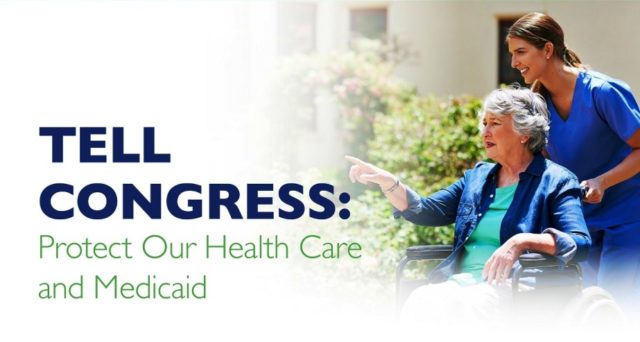HPAE Health Professionals Speak Out to Protect our Health Care
In the face of strong public opposition and resistance from members of their own party, Mitch McConnell and other Republican leaders in the U.S. Senate have failed to pass the second version of their “repeal and replace” healthcare bill. However, we must continue to resist any efforts to take away health insurance and limit access to healthcare.
Below, four HPAE members speak out on why the bill to replace the Affordable Care Act (ACA) would have been so harmful to our patients.
Barbara Rosen
RN and HPAE Secretary-Treasurer
I’ve worked for more than 40 years as a nurse and nurse educator at a regional psychiatric and long-term care facility. Our patients often have multiple medical and mental health needs. Some are geriatric patients suffering from dementia, others adolescents with acute mental health issues, some young adults with substance abuse addictions they are struggling to overcome. We are the largest facility of its kind in our state, and unique in its patient population. The vast majority of our patients are on Medicaid and have no other options for care other than our hospital. I’ve seen patients that over time others would have given up on, yet we do not. We know what it means to a family when a teenager or young adult is able to re-build their lives – or when a family visits their elderly loved one, knowing they are getting the care they need. I also know what happens when services are cut, or profits come first.
This newest GOP tax plan disguised as a healthcare bill upends 50 years of progress we’ve made – and the drastic cuts to Medicaid threaten the hospital’s financial stability – and its future. No matter what, we will need to care for people in crisis – but we won’t be able to live up to our oath and obligation as healthcare professionals.
Justin O’Hea
MSW, LSW at Rutgers University/Piscataway Acute Partial Hospitalization Program
I work with a woman who was diagnosed with Schizophrenia and living in supportive community housing for more than 20 years. She held a job for much of that time, and was stable for decades, because of her employment and the support of her housing provider and case manager. There were issues with her insurance that the blood tests for her medication (Clozaril) were no longer covered through her HMO, and she had to discontinue her medications. She had a terrible relapse, and was unable to be stabilized in community based psychiatric programs or hospitals. She wound up having numerous long term hospitalizations in one of the state hospitals, lost her job, almost lost her housing, and the cost of getting back to stability was astronomical. These are the kinds of breaks in care I am most worried about if we pass the GOP plan. We could take patients who have been stable for decades, and cast them back into acute level treatment which is exponentially more expensive than in community outpatient care.
Donna McNamara
Utilization Review RN at AAC/Sunrise House
Through my experience working in addiction treatment, I have witnessed patients take back their lives and move in a positive direction to repair the damage that addiction inflicted on themselves and their families. If the Senate GOP healthcare bill moves forward, not only will we see more patients receiving inadequate treatment but there will be an increased number of patients relying on hospitals for care. Although hospitals provide excellent care for those who face acute episodes, after treatment, patients are sent back into the world without successfully detoxing and without the resources they need to keep sober. Medicaid and the ACA opened doors to make treatment affordable and accessible and without those programs most of my patients cannot afford effective treatment.
Doris Bell
RN and Local 5118 President at Cooper University Hospital
The hospital I work at is an inner city hospital and a safety net hospital for many uninsured patients in our community. Through the ACA, many of my patients have been afforded the ability to get coverage and have been able to manage their illnesses better. The drastic cuts to Medicaid proposed by the Republicans in Congress will put our hospital at financial risk as well as risk our patients’ health. We will go back to when patients used the Emergency Room as a main source of care, which is both ineffective and expensive. These patients often need follow-up care and medication to sustain their health – without Medicaid, they will be unable to stay healthy, even if our hospital treats their immediate needs.
Click here to read an article in the New York Times about the Senate bill.

